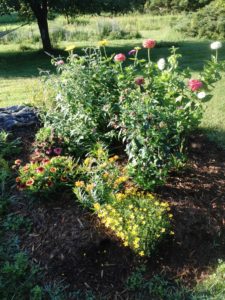Perhaps a special attribute of humanity is our ability to continuously learn throughout our lives. In addition to that, we have the ability to learn from those who came before us. Creatures of the natural world seem to have mastered the tools and behaviors needed to succeed in their roles (unless disaster or people disrupt things too much). As time goes on, and we get better at understanding the natural world, we appreciate things that we dismissed before.

This is a remarkable time, although what we learn may be surprising to us. The importance of insects in the grand scheme of things is an area that might seem counter-intuitive to us. I love Aldo Leopold’s quote, “The last word in ignorance is the man who says of an animal or plant, “What good is it?” If the land mechanism as a whole is good, then every part is good…”
This certainly applies to insects, which for most of us elicit an automatic unfavorable response. We first think in terms of those that either bite us or want to share the shelter of our homes. Next we think of those that want a share of the food or flowers that we grow. After that, perhaps we think of those that are beautiful or just interesting to watch. In all cases we probably miss the point – without insects to eat plants and transfer solar energy, the natural world would collapse quickly. Eliminating just one of the hundreds of thousands of species of insects in the natural world would cause ecosystems to undergo major adjustments to try to compensate. Adding invasive, non-native ones does the same thing. We are experiencing both right now, in the decline of native bees and butterflies, and the introduction of things like the emerald ash borer and Japanese beetle. We are ignorantly rocking the ecological boat, but seem to be surprised when that boat starts to swamp. And we compound our ignorance in the way we try to address the problems we create, thinking we can poison our way out of trouble.
As Douglas Tallamy points out in his book “Bringing Nature Home,” one mostly encounters minor disease and pest problems in healthy, diverse natural places. That’s because native plants and animals have developed ways to control each other. Where we don’t tip the scales out of balance, natural areas have plenty of plants, and lots of insects, plus lots of other creatures which feed on insects and are fed on by them in return. There are millions of automatic checks and balances which keep things from getting out of control, and on their own, they work very well.
So the best thing we can do is encourage more native wildlife in our world- in our yards, gardens, and parks. It doesn’t have to be drastic or happen all at once, adding a few more native plants each year will help.
Most people are aware that monarch butterflies are having a hard time. Our immediate area is an important breeding ground for them, as many other parts of the country lack the climate and native plants that are necessary. Their winter home in Mexico is tiny, and shrinking. If they are to survive, it’s places like Manitowoc and Two Rivers that will make a difference. We are a monarch butterfly factory. We need to recognize that and maybe do a little bit more to help. Even a tiny butterfly garden that includes native plants can be an important stopping place for migratory butterflies. Planting just a few square feet with a few dollars worth of the right flowers can make a difference to these pollinators. It’ll also make your yard more pleasant and you’ll feel good about yourself and what you’ve done. There’s still time to start a butterfly garden this year – certainly the rain and warm temperatures are helping flowers grow.
There are many places to find information about gardening for butterflies and other insects. In the photo is a five-foot diameter bed with a variety of native and a few non-native plants- butterfly milkweed, blazing star, bidens, bee balm, coneflowers, blanket flower, butterfly bush, and zinnias. With a little mulch they hardly need watering or weeding, and butterflies and bees visit constantly. Gardening for them not only helps nature in general, but makes our yards more beautiful and helps us as well – perhaps more than we know.
